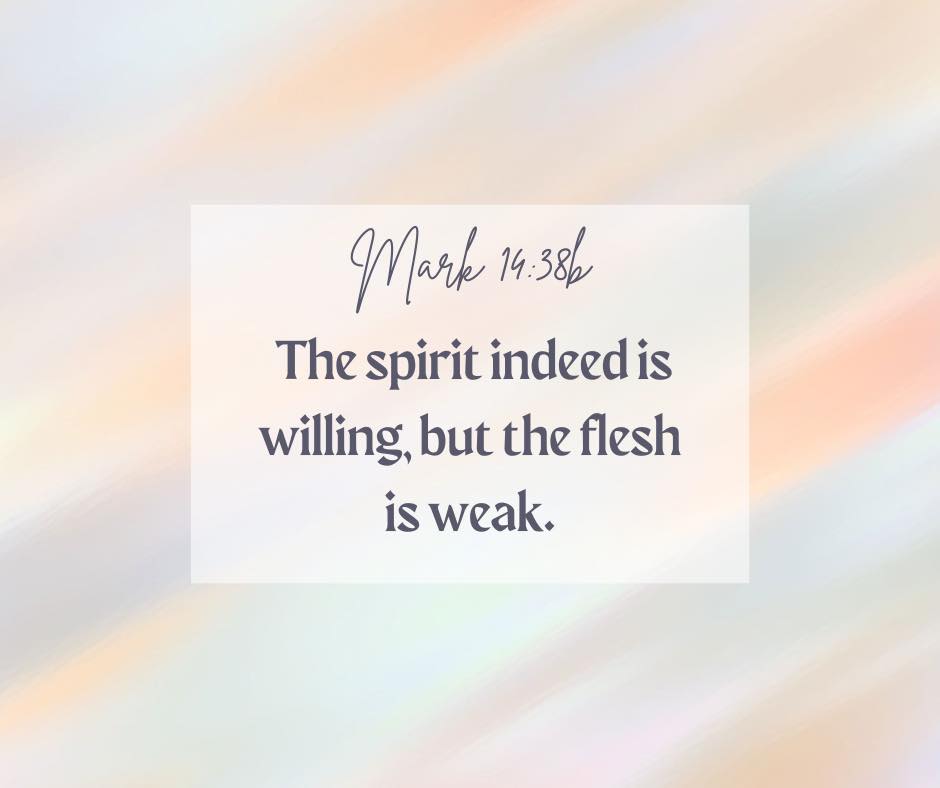|
Jesus didn’t fire the disciples for sleeping on the job in the garden. He didn’t terminate them when they panicked in a storm. He didn’t kick them out of his circle even when they argued about who would be the greatest in the kingdom! Can you imagine? I would have thought they’d be disqualified then and there. But He understood their flesh was weak, and He was patient and so merciful.
Anybody feeling weak? There are days when it feels like a chore to pray and read the Bible. Yes, I said it. I’ve recognized that when I’m struggling emotionally or mentally, reading and praying is difficult because I often don’t “feel” anything. Then I become more discouraged that my spirit isn’t strong enough to overcome the flesh. BUT...today I recalled a verse of Scripture in a TOTALLY different way than I’d ever thought of it before. Jesus had been praying before his arrest. He had asked his friends to keep watch and pray with Him. Mark 14:37, 38 says, “And he came and found them sleeping, and he said to Peter, “Simon, are you asleep? Could you not watch one hour? Watch and pray that you may not enter into temptation. The spirit indeed is willing, but the flesh is weak.” I had always read those words as chastisement and rebuke. As an indictment against the disciples. Today, I heard them in my spirit in a tone of compassion and understanding, even sympathy. Jesus knew what it was like to be tired! I heard those words in the same tone one would use when lifting a small child out of their car seat, who had dozed off on the ride home. “You’re sleepy, aren’t you, buddy? I know, it’s been a long day.” Yes, Jesus’s words are a warning. They encourage us to be vigilant. But there is so much love in them. How often do we miss the love in His voice? I pray we’ll hear the compassion that compels us to come to Him, and not condemnation.
0 Comments
After three weeks of stomach pain and nausea for my nine-year-old son, and a previous doctor visit that didn’t provide answers, I took him back to the pediatrician on a Saturday morning. The outcome of the visit was an immediate trip to a hospital’s emergency department to rule out appendicitis.
There were incredibly tense moments throughout the day as my son’s symptoms worsened. But after nine tiring hours of lab work and three different kinds of imaging, everything “scary” had been ruled out and a probable cause identified. It wasn’t until we left, overwhelmed with equal parts exhaustion and relief, that it hit me: I’d forgotten to worry about everything else that day except my son. All the things I normally spent energy on took a backseat. There had been no room in my thoughts for less urgent things. That experience was more shocking than one might expect—a Twilight Zone moment where the world had gone on around me while time stood still inside the hospital. My husband had taken our youngest child to a birthday party. Did I care that I hadn’t picked out his clothes before I left that morning and that they might be mismatched? No, though normally, this would have seemed important. My fifteen-year-old worked a shift at a local restaurant that afternoon, and it was her sixth day on the job. During her first five days, I’d spent the entire time wondering how she was adjusting and if everyone was being nice to her. I still cared about those things while at the hospital, but I didn’t let myself worry about them. She was fine, and my other daughter at home was fine, too. There were so many things I’d wanted to accomplish that day, but nothing on my “to do” list mattered in comparison to my son’s needs. When I realized all the things I neglected to worry about, it was proof that letting go of worry is possible, though it had come at a price. And that got me thinking. What if, instead of letting worries be pushed aside only by bigger, more pressing worries, I let the Word of God take their place? Our Lord taught that worrying about day-to-day things is unnecessary. In the familiar passages of Matthew 6:25-34 and Luke 12:22-31, Jesus speaks of how the Father feeds the birds, and how He clothes the grass of the field. God knows what we need, and since we’re more valuable to Him than birds and grass, we can trust Him to take care of us, too. Jesus also said, “Which of you by worrying can add one cubit to his stature?” (Matthew 6:27 NKJV). This rhetorical question begs us to stop and ponder the futility of worry. We can worry all we want, but it won’t change anything. Obviously, there’s a difference between necessary concern and worry, between reasonable diligence and panic. I care about all the things related to my family’s well-being, but I don’t have to worry about any of them. In my flesh, that’s extremely difficult for me, especially as we face continued illness in my family. May the Holy Spirit help us all to give our cares to Him daily. Cast all your anxiety on Him, because he cares about you. 1 Peter 5:7 NASB Originally published on AriseDaily.com. A tingling sensation rises in my chest, accompanied by a gentle pressure and a bubbling up of emotion that lifts my shoulders and brings a smile to my face. The tingling spreads to my arms and I find myself singing a familiar song: I just feel like something good is about to happen. I just feel like something good is on its way. Excitement. Sometimes, it overwhelms me. I'm usually at work, doing an ordinary task when, for a fleeting moment, I'm struck with jubilant anticipation. The feeling is almost always accompanied be the song, and it makes me want to jump to my feet and shout. Maybe these bursts of excitement are from too much caffeine (I drink an awful lot of caffeine,) but it feels more like the springing up of an eternal hope, like a hug from the Holy Spirit. Am I alone in this, or do you feel it, too? Do everyday moments ever feel like the night before Christmas, or like there's one more number to be announced on a prize-winning ticket and all your numbers so far have been a match? That's what it's like for me. I just feel like something good is about to happen. I just feel like something good is on its way. Granted, there are plenty of times where I feel anxiety or sadness in much the same way. But those occurrences seem more in line with my human nature. The excitement I experience has a supernatural sense to it. Maybe I feel it because the Lord is getting ready to drop a new idea into my spirit or reveal a new ministry opportunity. Maybe a personal dream is going to come true or someone in my family will accomplish something great. It sometimes feels like, at any moment, something unexpected and wonderful could happen to me. The next email I open or phone call I receive could be about marvelous, life-changing news. Any day now, the Lord could grant one of my heart's desires, simply because I delight in Him. (Psalms 37:4) Or maybe the excitement is about something greater. I liken it to the feeling Zacchaeus must have had as he climbed down from the tree, knowing he was about to break bread with Jesus. It's the feeling I imagine in the parable of the ten virgins, for the ones who were ready for the bridegroom, when the cry was made at midnight, "He's coming! Go meet him!" The sensation could very well be my spirit "Looking for that blessed hope, and the glorious appearing of the great God and our Saviour Jesus Christ." (Titus 2:4) That's definitely something good that's on its way. Whatever the cause, I'm thankful. Even if it's because of too much caffeine, I just feel like something good is about to happen. I hope you do, too. I just feel like something good is about to happen I just feel like something good is on its way He has promised that He'd open all of heaven And brother, it could happen any day William J. Gaither, copyright 1974 Here's a link to the Gaither Homecoming version of the song referenced in this post. (Jessy Dixon's part in this gets me!) And another great version is below. Please help me, Lord, I prayed. Please make this easy.
My dentist visits are times of fervent prayer. During even the simplest of procedures, I almost always end up crying from anxiety, at least a little, and it seemed the recent visit to fill two cavities would be no different. As the dentist came at me with the needle, I prayed harder in my mind. Please help me get through this. My prayer was desperate, pleading. Then something life-changing happened. The dentist poked the needle into my gum, and I stopped praying. I quit begging God to help me. Instead, I began to thank God for being so good. I changed my prayers into praises, and the panic lifted--it dissolved and floated toward the heavens with my words of adoration. It was the most painless injection of Novocain ever. So, I kept praising, right through the drilling, and the result was nothing short of miraculous. You are Magnificent, Marvelous, Wonderful, Worthy. Magnificent, Marvelous, Wonderful, Worthy. Over and over, I offered those words silently. At some point, I remember thanking God for a good dentist who can fix my teeth. In a gentle voice, the dentist said, "You're doing good," as he worked. He always says that, because he's kind and genuinely empathetic about my anxiety. But for the first time, I actually felt like I was doing okay. Not just getting by. Not just managing. I was good. Psalm 34:1 rang in my mind. I will bless the LORD at all times: his praise shall continually be in my mouth. And though the praises weren't actually coming from my mouth--a little hard to do when your teeth are being drilled--they were there in my heart, thanks to the prompting of the Holy Spirit, Who knew what I needed to do. God heard my original request to make the visit easy, and He used my praises to accomplish it. I've visited the dentist a lot over the past year, since I finally decided to prioritize oral health over my fear, and I've still got a few more visits left to get all the problems corrected. But if I can just remember my "secret weapon," I don't think I'll dread the next visit so much. Now to try praising the Lord on an elevator... What makes you panic? Maybe praise is your answer, too. When we jump to a conclusion, we often land in a misunderstanding. Such was the case for some of the children of Israel, as documented in the book of Joshua.
After the journey in the wilderness for forty years, before the people crossed over Jordan and into the Promised Land, three groups of them—the tribe of Reuben, the tribe of Gad, and half the tribe of Manasseh—asked Moses to let them remain on the East side of Jordan and possess that land instead (Numbers 32.) Moses granted the request on the condition that soldiers from those groups would first help the other tribes conquer Canaan—an effort that would take “a long time” (Joshua 11:18.) When the wars were finally ended and all the tribes had received their inheritance in the Promised Land, the men of the tribes of Reuben, Gad, and the half tribe of Manasseh, crossed back over Jordan to join their families. That’s when the misunderstanding occurred. Joshua 22 tells us that the East-of-Jordaners built a great altar on their side of the river, and when the people on the West heard about it, they assumed it was a pagan altar. So, the West-of-Jordaners “gathered themselves together at Shiloh, to go up to war against them” (Joshua 22:12.) Fortunately, Israel didn’t go immediately into battle. The tribes first sent ambassadors to Reuben, Gad, and Manasseh and confronted them about their supposed wrongdoing. ‘How could you rebel against the Lord this way?’ they said. On one hand, the people on the West had good reason to be concerned. They’d seen firsthand that God doesn’t deal lightly with rebellion. If there was any chance their brothers on the other side of the river had fallen into idolatry, it could have resulted in destruction for all of Israel, and they had been commanded to remove idol worship from among them at all costs (as we all should.) But their assumptions about the East-of-Jordaners’ intentions were wrong. The purpose of the altar is explained in Joshua 22:27: “But that it may be a witness between us, and you, and our generations after us, that we might do the service of the LORD before him with our burnt offerings, and with our sacrifices, and with our peace offerings; that your children may not say to our children in time to come, Ye have no part in the LORD.” They wanted a symbol of their shared faith, a reminder to future generations that, though separated by the river, they were still part of God’s chosen people. So, they called the altar Ed, meaning witness. May we always be mindful of our witness to those around us. May we aim to leave a road map for future generations, to lead them in the right path. Israel accepted their brothers’ explanation, but can you imagine how it felt to be accused? It must have been hurtful, especially after the tribes of Gad and Reuben and the half tribe of Manasseh had spent years fighting alongside the rest of Israel to take the land of Canaan that God had promised. They were family; they were on the same team. I know a little of that kind of hurt. I once tried to help someone, but my intentions were grossly misinterpreted, and even though I tried to explain, the person wasn’t willing to hear or accept my heart on the matter. How much dissension we could resolve in the body of Christ if people were willing to listen to one another. Believers should be careful to avoid sin and unafraid to call it out, when necessary, but we should always give our brothers and sisters the benefit of the doubt. Maybe there’s a good reason the other party said what they said or did what they did. Maybe the point of contention is all a big misunderstanding. Just because someone doesn’t do things the way we do doesn’t mean they’re wrong. Talking things out may be all that’s needed to bring resolution. The story of the altar called Ed on the East side of the Jordan River should be a reminder to us all: Be wary of sin, but don’t jump to conclusions. I'm trying to get comfortable sharing messages on camera every once in a while. (TikTok filters really help.) So here are some thoughts about an experience I had recently, when I was convicted in my spirit for saying "I can't." I hope this message encourages you. Do you need reassurance that God knows the end from the beginning? That's what I got out of a story from Exodus this week.
In chapter three, God spoke to Moses, instructing him to lead the Hebrew people out of Egyptian bondage. Moses was told to go before Pharaoh and demand that he let God's people go. But God told Moses, "And I am sure that the king of Egypt will not let you go, no, not by a mighty hand." (v 19) God already knew that Pharaoh would say no. The next verse says, "And I will stretch out my hand, and smite Egypt with all my wonders which I will do in the midst thereof: and after that he will let you go." (v 20) God knew how things would play out, and each of the plagues was part of His plan. He wasn't surprised when Pharaoh changed his mind about letting the Hebrews go the first, second, third, or ninth times. But it doesn't seem that Moses was privy to the details. He only knew about each plague when he was given the next assignment to petition Pharaoh (with threats of water turning to blood, frogs, lice, flies, livestock pestilence, boils, hail and fire, locusts, darkness, and the death of the firstborn children.) God knew that Moses would come before Pharaoh multiple times with the same result. (Also see Exodus 7:2-4.) I don't understand why we face certain challenges, except that they can refine us and help us grow closer to God. But sometimes it's tempting to want Him to press fast-forward on the battle and get us to the victory. Or at least give us a hint about when it will be over. I want to know what I'm up against, on a scale of one to ten plagues. But His plans are good, even when I don't understand. Our God is not bound by time. He is already in the future, even while He's here with us in every situation. He knows the end of the story. In every difficulty, we can take comfort in knowing that, in time, we'll be able to simply "stand still, and see the salvation of the LORD." (Exodus 14:13) My ten-year-old is a cheeky one. She recently overheard me on the phone, telling my mother that my husband had taken two of our kids to the store while I stayed home with "the other two."
"What--we don't have names anymore?" my daughter quipped. She shot me a pretend look of indignance, and I chuckled, which was her goal. But her joke immediately reminded me of something I'd recently studied, about three characters from the Bible whom some refer to as "the three Hebrew children.” Shadrack, Meshack, and Abednego are often referred to in this generic way, in story books and songs, as if the young men who refused to bow to King Nebuchadnezzer's golden statue in the book of Daniel didn't each have a name. But the interesting thing is, Shadrack, Meshack, and Abednego aren't even their real names. Those are only their slave names. Daniel 1:6,7 tells us, "Now among these were of the children of Judah, Daniel, Hananiah, Mishael, and Azariah: Unto whom the prince of the eunuchs gave names: for he gave unto Daniel the name of Belteshazzar; and to Hananiah, of Shadrach; and to Mishael, of Meshach; and to Azariah, of Abednego". From a transcribed sermon from the late Rev. Chuck Smith, I learned that Hananiah means "Beloved of the Lord", but his Babylonian captors changed his name to Shadrack, meaning "Illumined by the sun god." Mishael means "Who is as God?", but it was changed to Meshack, meaning "Who is like Shak?" Shak was a false Babylonian deity. Azariah means "the Lord is my help." They changed it to Abednedgo, which means "the servant of Nego", another false god of the region. (Along the same lines, Daniel means "God is judge" while Belteshazzar means "Baal's prince.") Hananiah, Mishael, and Azariah had beautiful names that spoke of the goodness of God, but they were given names that meant much the opposite. Their new names paid tribute to idols. What a heavy weight that must have been for "the three Hebrew children" who served the true God! But, even though history remembers them mostly by these slave names, their stories prove that they never forgot who they really where. When these three young men were threatened with death but still refused to bow, it was because they knew that no one else can take the place of God (Mishael), and that they could be brave in the face of danger because God was their help (Azariah). They trusted that God loved them (Hananiah). Their slave names did not define them. They remembered who they were in God. Like the Babylonian captors, our enemy assigns labels in an attempt to break us. The world calls us things far removed from the truth, and people spin words to cause discord and tear us down. If you claim to be a patriot, they'll say you're a nationalist. If you stand up as pro-life, they'll call you anti-choice. If you love someone but don't agree with all their choices, they'll declare that you're a bigot. If you're a traditionalist, they'll call you old-fashioned. If you're a Creationist, they'll call you anti-science. If you're in love with Jesus, they'll call you an extremist. But the world's labels don't define us; we don't have to accept them. If you're a child of God, that's the only title that matters. Some of the names people should reject might be related to their circumstances, rather than their beliefs. Minority doesn't mean victim. Adopted doesn't translate to damaged. Broken doesn't mean worthless. Hurting doesn't mean hopeless. Don't buy what the devil is selling. He may try to give you a name, but it doesn't mean that's who you are. Since the days of the early church, followers of Jesus have born the name. Acts 11:26 says, "And the disciples were called Christians first in Antioch." That's who we are. We're Christians, followers of Christ. When the world calls you something you're not, don't let it get you down. Keep following. Keep trusting. Remember who you are. How do you feel about where you live? Are you anxious to move, or do you plan to stay put for a long time?
I enjoy looking at real estate. We talk about moving "some day." I browse the listings often for houses, or land where we might build a home. Our house is great, but it feels a little crowded for a family of six sometimes, especially as the kids get older and want their own space. I daydream about a house with a covered front porch and a little creek running through a wooded backyard, and with plenty of land to take nature walks and have a garden. The dream house has a big, open kitchen and a basement, suitable for having company over. It would have a screened back porch where I could sit and enjoy writing. But for as much as I think about moving, there’s the idea that I may be too attached to our home of the last twelve years to ever leave it. This is where I’ve raised my children. We’ve made so many precious memories here. We have a nice neighborhood, convenient to schools, shops, and restaurants. It’s familiar. It’s the only home I’ve ever owned. Another thing is that my nine-year-old tells me we can never buy another house, unless we’re able to keep this one, too. She’s adamant that she doesn’t want to move, no matter what kind of place we find. I understand how she feels. I feel a similar pull between my earthly and heavenly homes. The Lord has given me such joy here that I sometimes conflate my earthly blessings with their Source. But the Bible says, “Lay not up for yourselves treasures upon earth, where moth and rust doth corrupt, and where thieves break through and steal: But lay up for yourselves treasures in heaven, where neither moth nor rust doth corrupt, and where thieves do not break through nor steal: For where your treasure is, there will your heart be also.” (Matthew 6:19-21) It’s good to think about the moths and rust. If everything were perfect here, I might never want to leave, but earth is not my permanent home. 1 Corinthians 2:9 says, “But as it is written, Eye hath not seen, nor ear heard, neither have entered into the heart of man, the things which God hath prepared for them that love him.” We can’t fathom it all, but Jesus has prepared a place for us where there are no viruses, politics, or social media squabbles. There is no fear or sorrow. There is no worry about the future. Best of all, it’s where He is. That makes my relocation something I look forward to..."some day." I walked through the kitchen singing a worship chorus I wrote some time back. The song began sincerely. Sometimes, the Spirit takes over and pours out what I’ve kept bottled up for too long—the praises that are owed to the Lord. But somewhere in the middle of my song, a sneaky spirit of pride crept in, and a fleeting thought hit my mind. I wish more people could hear this song. It’s pretty good.
On one hand, the thought wasn’t terrible. We’re called to use our gifts for Him, and that, in part, means sharing them with others. During the time of coronavirus and stay-at-home orders, I didn’t have the opportunity to sing in church. And my well of words dried up, too. I didn’t write for months. I went through a season of unfruitfulness, creativity-wise, and I felt incomplete not using those particular gifts. The longing for an audience wasn’t necessarily bad. It was normal for someone who feels called to share about God through writing and music. But in another sense, the thought was wrong, strictly prideful, and I was convicted as the Lord spoke to my spirit. “Am I not enough?” I heard Him say. “Do you need a bigger audience than me?” Tears pooled in my eyes. I searched my heart and found an important lesson: When I use my talents, they are not wasted, even if they’re directed to God alone. Every note I sing to Him is of value if it’s done with a sincere heart. If every word I ever wrote served no other purpose but to prove that I would be obedient to Him, they would all be worth writing. Our Audience of One is our most important audience. (There’s a great song called “Audience of One” written by Michael Weaver of the band Big Daddy Weave.) It’s certainly good to have goals, but I don’t have to stress over book sales and social media followers. I don't count compliments about my singing. I have one number to keep up with—one holy God who is my most important audience. The Bible says, “But seek ye first the kingdom of God, and his righteousness; and all these things shall be added unto you.” (Matthew 6:33) The “all these things” in this verse specifically refers to what we eat, drink, and wear, but I think it can be applied to everything He has planned for us, including our audience. The Bible also says, “Delight thyself also in the LORD; and he shall give thee the desires of thine heart.” (Psalm 37:4) That's a conditional statement; we have to focus on Him first. In a class at a writers conference last year, author/instructor Michelle Cox made this powerful statement: “God didn’t call you to be successful. He called you to be faithful.” That has stuck with me all this time. No matter the size of the audience, I'll continue to write and sing for Him for as long as He puts it in my heart to do so. And though I work to hone my creative crafts, and I pray to be used for the Kingdom, I'll leave the results up to Him--my Audience of One. |
About the BlogThank you for visiting my blog. I share devotional articles and musings about life, parenting, and the writing journey, as well as important news about my books. I hope you find something of interest here! Click below to sign up for my email newsletter, which includes links to my latest blog posts. Thank you!
Categories
All
Archives
August 2023
|











 RSS Feed
RSS Feed